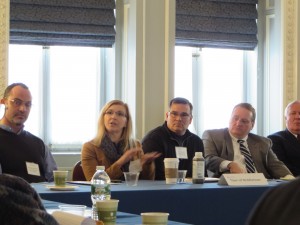Leadership Matters | Towns Participating in Innovative Leadership Development Program Report on a Year of Progress
Newport, RI—Leaders from Rhode Island’s cities and towns converged on the Pell Center at Salve Regina University on Friday, March 20, 2015, to report on a year’s worth of effort to improve the responsiveness and efficiency of local government. Part of Leadership Matters—a joint initiative between the Pell Center and the Public Sector Consortium, of Cambridge, MA—the innovation conference highlighted the work of the three Rhode Island communities to participate in the program’s inaugural year: Pawtucket, Middletown, and Newport.
Leadership Matters is a multi-phased leadership development program. In the first phase, each community sends four team members for 64 hours of classroom instruction in facilitative leadership, systems thinking, negotiation, and strategic planning. In the second phase of the program, the teams work on an innovation project they design in their respective communities. Leadership Matters supports each participating community with additional training, mentoring, and, when requested, coaching from experienced public leaders. Finally, participating communities come together one year after the end of the coursework to brief their projects in an innovation conference, to share lessons learned, and to begin to create a community of shared experience across the state.
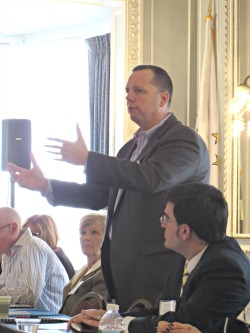 City of Pawtucket
City of Pawtucket
Steward: Mayor Don Grebien
Team: Melissa Devine, CFO, Pawtucket School Department; Joanna L’Heureux, Finance Director, City of Pawtucket; Dylan Zelazo, Chief of Staff to the Mayor
Project: Delivering High Quality Services to the People of Pawtucket
Pawtucket’s team, led by Mayor Don Grebien, tackled a project that is common to communities across the country: ensuring “all departments within the city and school system operate collaboratively and consistently deliver high quality services to the residents, students, and employees as effectively and efficiently as possible.” The primary focus of their innovation project was the integration of systems between the city and school department to improve productivity and efficiency.
When putting together the vision statement for Pawtucket, the team wanted to make sure that they considered all of the stakeholders involved in improving the relationship between the city and the school system, because, as Zelazo later explained, a shared vision is crucial to solving problems. The Vision Deployment Matrix—a tool each team is trained on as part of Leadership Matters—helped Pawtucket illustrate their desired future reality and the processes to reach it.
According to Zelazo, the training in systems thinking was essential in reinforcing Pawtucket’s vision. The team developed two systems maps to answer two questions:
- Why do we struggle to meet internal customer/end user expectations?
- Why do we continue to struggle to provide “common functions” cooperatively between the city & school department?
By having staff from both city hall and the school system meet each other and discuss their needs, inefficiencies between the city and the school were identified and addressed. One result of the discussions was hiring a Parent Community Engagement Coordinator, as well as a joint HR Director and joint IT Director.
Devine and L’Heureux noted the challenges of a joint finance system were many, including the need to break the habit of sending emails and placing phone calls to anonymous colleagues who were known by name or office, but not in any depth as a professional trying to do his or her job. One of the breakthroughs described by the Pawtucket team came in the form of meeting colleagues across the financial operations of the city and the schools. Meeting in person and getting to know each other as colleagues helped improve morale and facilitate collaboration.
Another challenge was upgrading archaic IT systems with new computers and servers to better accommodate the city and the school departments. The new, joint IT director, however, was able to leverage economies of scale and make limited tax dollars go farther.
The team also organized a one-day workshop of additional training for branches of the staff outside of the senior positions to better improve internal relationships down the line.
The impact of training like the kind seen in Leadership Matters is contingent on the commitment of leaders in each community. Pawtucket is no different, and the team members Mayor Grebien brought into the first cohort of the program each shared different insights. Devine, the CFO of Pawtucket Schools said she has “learned to rethink how I need to rely on people who I supervise; to delegate and believe in the staff; and to invest the time in listening to staff at all levels.” L’Heureux, the finance director for the city, said she had learned to be “much more cognizant of other people’s mental habits and the need to get them out of their silo.” Zelazo, the chief of staff for Mayor Grebien put it this way: “Leadership is a practice, everyone can become a better leader.”
Mayor Grebien himself shared an insight. In the question and answer period at the end of his team’s presentation, the mayor confided that he had “learned that reinforcement is a significant part of leadership.” As if to underscore the point, Pawtucket has sent a second team to participate in Leadership Matters—this time led by Superintendent of Schools Patti DiCenso—promising deeper collaboration, efficiency, and effectiveness in Pawtucket for years to come.
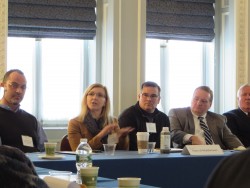 Town of Middletown
Town of Middletown
Steward: Shawn Brown, Town Administrator
Team: Lynn Dible, Finance Director; Tom O’Loughlin, Public Works Director; Matthew Wainwright, Technology Director
Project: Implementing a municipal customer service model
Most citizens engage city hall when they need a permit or a license or have a complaint. The challenge for municipal leaders everywhere is to respond efficiently and effectively while also maintaining the capacity to take on bigger initiatives. The team from Middletown, RI, tackled these challenges head-on and sought to use changed leadership practices with new technology to improve the services provided to the town and its citizens.
In its most basic form, Middletown’s vision aimed “to implement a municipal customer service model with a high level of quality (accountability and control), customer satisfaction and availability” and provide a “universal standard of customer service” whether in-person or online. A focus on self-service solutions, the team reasoned, would save time and resources for the town, but also for citizens.
To expand the capacity and develop the strategic plan for this work, Town Administrator Shawn Brown invited most of his key leaders to town hall for a day of strategic planning and learning. The assembled team developed a matrix which outlined the actions needed to be taken to move the town from its current reality to a desired future. One critical aspect of this work was the recognition among team members that the Department of Public Works has a very high number of citizen interactions every day. As a result, the entire public works division spent a day building the customer service skills in a day-long workshop last autumn. Most attendees had never been given such training previously. These two initiatives, alone, expanded the group of public servants in Middletown with the opportunity and training to contribute to the innovations project by improving their own performance capacity.
In addition to its essential investment in its people, the municipal leaders in Middletown are investing in innovative tools to better meet the needs of its citizens. Some of these tools include:
- Basecamp-a hosted solution system for project management, is a streamlined alternative to group emails and currently hosts 80 projects and has 60 users.
- ZenDesk– a subscription service program for citizen requests, serves as a single channel for customer service request and as a knowledge base. According to Technology Director Matthew Wainwright, 300 citizen requests have been made via mobile, email and telephone with an average response time of 18 hours. The metrics ZenDesk provides are valuable pieces of information for decision-makers.
- ViewPermit-holds inventory of every permit the town has—the management of ViewPermit is driven by clerks, while managers offer support.
Wainwright stated that Middletown must continue to “be willing to change and adapt” without “sitting on our laurels.” Although the town won Google’s eCity award in 2013, the progress cannot stop there. Since implementing these automated systems, the town has learned which are the most common questions and concerns for citizens. Changes in the town’s website followed—including augmented information and simplified navigation to make it easier for people to find the information they need—whether about voting booths or when the town’s famous beaches would open.
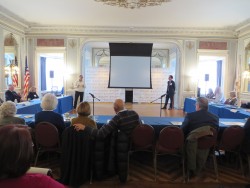 City of Newport
City of Newport
Steward: Jane Howington, City Manager until June 2014, then Laura Sitrin, Director of Finance
Team: Bill Riccio, Director of Public Services; Naomi Neville, Member of the City Council;
Project: Exceeding customer expectations
One of the challenges that every community faces at some point is the transition in leadership that accompanies elections or personnel changes. The goal then must always be to create a culture of innovation that embraces the best tenets of leadership, regardless of the individual personalities involved.
This was certainly the challenge facing the talented team from Newport when their initial steward, Jane Howington left Rhode Island for a professional opportunity in Ohio. Fortunately, Finance Director Laura Sitrin was ripe for the challenge. She had, in fact, been leading the innovations work since the project began in March of 2014, meeting almost every two weeks to assess progress and adjust efforts. Among the first products they delivered was a vision statement:
Striving to Exceed Customer Expectations
- Working together as a team
- Sharing vision; sharing resources
- Supporting each other; respecting each other’s skills and abilities and knowledge
- Feeling empowered by what we can do/achieve
- Every department’s vision supports the group vision
The team from Newport identified services provided to the community, identified end-users, assessed the expectations of customer service, and reviewed measurement systems to build an understanding of how to meet customer service goals. By working through this process as a group, the leaders developed new ways to make improvements and also began to gain a perspective on the demands and issues that their colleagues faced in providing services.
Formal learning programs for City Hall employees began with a systems thinking practicum in April 2014. Municipal leaders analyzed the current system that answered the following question: “Why, despite best efforts, have we not been able to integrate the systems and services within City Hall, to meet the current citizen expectations with the resources we have?” Their work resulted in a focused and strategic look at how customer needs are met and what can be done better.
Sitrin took the model of facilitative leadership taught in Leadership Matters to heart. In the meetings she organized for municipal workers, Sitrin made a conscious decision to not insert her own views into discussion, withholding them and, instead, encouraging others to speak. One such person was Nancy Lalli, a controller in the finance department, who joined the Newport team for their presentation at the innovation conference.
Lalli and Sitrin explained to the conference participants how the team needed to focus on the way the city would deal with issues coming from citizens; manage staff to accommodate citizens’ needs; and develop “one-stop” shopping for Newporters to get the right resources. To make sure that the committee meetings were efficient, they established rules of engagement—respect, confidentiality, etc. By defining customer service and management through this process, issues were readily identified.
Sitrin and Lalli relied on their vision deployment matrix. They “want employees to be confident, valued, and relaxed” and “want citizens’ to have their expectations [of the City of Newport] exceeded.” There was special training for staff who answered phones with customers—because there was no formal training in place before, employees were pleased to undergo the training. The skills the employees had learned during the training could be immediately applied.
Another question Newport sought to answer during Leadership Matters Rhode Island was “How do we improve [the City of Newport’s] public image?” Four committees were selected to address this problem—marketing, social media, city hall building, and phone/email improvement. Newport worked with Worldways Social Marketing to develop solutions. Marketing and social media were eventually grouped together—Worldways developed a Facebook page and a new website that supports an employee portal for internal communication. To reinforce the new procedures for answering the phone, as well as email, there were measures of success that employees were held accountable for (response time, correct transfers, etc.).
The committee to address the city hall building, which consisted of 18 employee volunteers, had collectively described the physical experience of being in the building as “dingy.” Several changes were made, as a result:
- The committee put together a list of 75 items that were refreshed, replaced, removed of relocated to improve the flow and feel of the building
- New planters were added to the front steps of the building
- A bulletin board was added outside to showcase city employees
- A volunteer greeter force was put in place to make customers feel welcome
It would be trite to say that a fresh coat of paint and some planters changed city hall—but a the process used to identify and tackle these issues speaks of a new day in Newport city government. As Riccio observed at the innovation conference, four city agencies have solidified relationships as a result of Leadership Matters. “Everyone has a mantra of continuous improvement” he said, and acknowledges that the changes being made are positive. Newport, like Pawtucket, has sent a second team for training in cohort II.
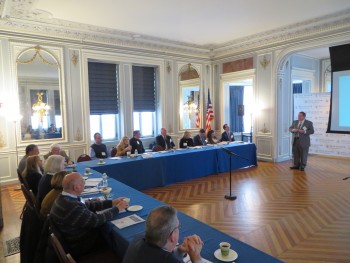
Leadership Does Matter
The challenges facing public leaders—whether in Rhode Island or around the world—can be reduced to one simple insight: leadership matters. Whether transforming the way city hall and a school system operate in concert, or making municipal services more responsive to the needs of constituents, the critical difference between a community moving forward or becoming mired in frustration is leadership.
In Rhode Island over the last eighteen months, three communities have launched a process of continued learning and innovation intended to improve the effectiveness of local government. This is no small task, but the payoff may be immense. Better, more responsive, more open municipal governments break down the barriers to progress that stymie innovation and economic development. With the continued leadership and commitment of public leaders like Pawtucket Mayor Don Grebien, Middletown Town Administrator Shawn Brown, and Finance Director Laura Sitrin of Newport and their talented teams, the sky is the limit.

